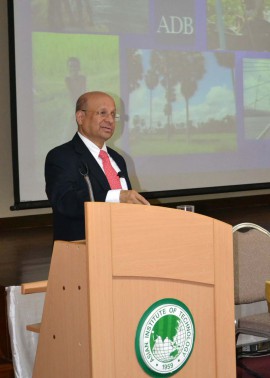
“Asian economies need to become knowledge-based to avoid the middle income trap and achieve successfully structural transformation,” Dr. Bindu Lohani, Vice-President, Knowledge Management and Sustainable Development, Asian Development Bank (ADB), conveyed during his talk on “Development and Innovation Challenges in Asia: Role of Knowledge Institutions” at the Milton E. Bender Jr. Auditorium, Asian Institute of Technology on 25 February 2015.
He further explained that a knowledge-based economy is one that has “conducive economic incentive and institutional regime, effective and appropriate system of education and skills, effective information and communication technology (ICT), and efficient research and development (R&D) and innovation.”
According to Dr. Lohani the future of Asia’s knowledge institutions will be driven by advances in ICT in delivering education. ICT can play a transformational role in the delivery of education and promotes equitable access to higher education through online courses. He said he takes online classes himself to expand his knowledge. He gave the same advice to the audience encouraging everyone to take online classes and never stop learning.
He stressed the importance of establishing centers of excellence (CoE) in universities and encouraged AIT to further develop COE partnership with ADB in the areas of education, environment, energy, regional cooperation and integration, transport, and water.
Being an AIT alumnus, he mentioned several collaborations between ADB and AIT. ADB has a total of 344 scholarships to AIT through Japan Scholarship Program including 21 scholars who are currently enrolled. Since 1986, ADB has engaged AIT in 61 contracts amounting to USD 5 million. From 2011-2014, ADB has engaged AIT in projects covering areas in agriculture, natural resources and rural development, transport, education, energy and power systems, transport engineering, and structural and infrastructure assessment in countries including Bangladesh, Mongolia, Nepal, Pakistan, PRC, Philippines, Samoa, Sri Lanka, and Tajikistan.
AIT President Prof. Worsak Kanok-Nukulchai moderated the Q&A session after the presentation which was well-attended by several faculty, staff, and students.
Dr. Lohani later visited AIT Consulting (AITC) office and met with Dr. Naveed Anwar, Executive Director, AIT Consulting and his team. AIT Consulting presented a concept note highlighting some of the possible areas for knowledge-based support to ADB which are in line with what Dr. Lohani mentioned during his talk. He advised that AITC should focus more on clean energy, sustainable transportation, urban development-smart livable cities and integrated water sanitation and management as well as environment and climate change which are the main areas ADB is currently working on.

